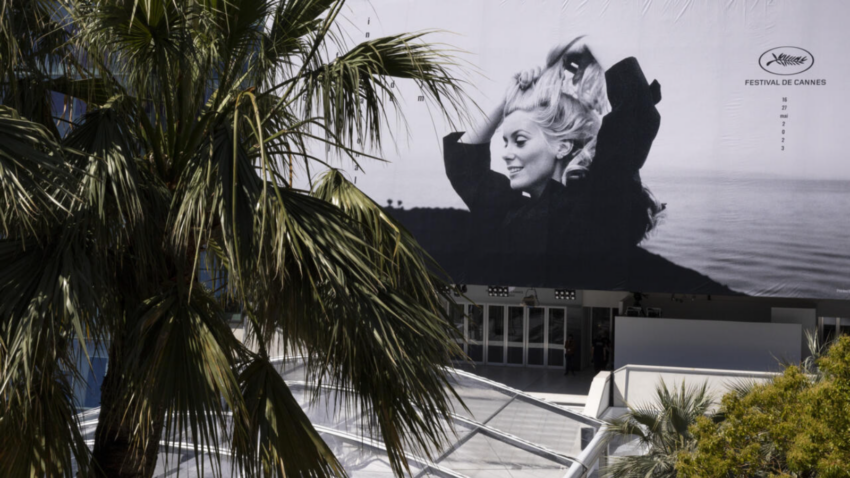The Cannes Film Festival is ready to open a blockbuster 76th edition on Tuesday with famed auteurs and Hollywood stars, confident that it has survived the COVID-19 epidemic and maintained its standing as the protector of the big screen. This year’s lineup includes more female directors and African entries, as well as Hollywood heavyweights Harrison Ford (in his final Indiana Jones appearance) and Martin Scorsese.
After Covid forced a no-show in 2020 and a scaled-back summer gathering the following year, the world’s biggest cinema expo is confident again.
Cannes’ palm-lined Croisette has long discussed the festival’s downfall. Premature again. Last year’s festival marked a return to form on and off screen, and the raucous premiere of “Top Gun: Maverick”—complete with a fly-past salute to Tom Cruise—showed Hollywood studios still loved the Riviera pageant.
Cannes launched three Oscar best-picture candidates, including the highly popular sequel. Ruben Ostlund’s Palme d’or “Triangle of Sadness” was another nominee.

Indy’s final battle
“Indiana Jones and the Dial of Destiny” by James Mangold will fill the “Top Gun” spot this year. After 42 years, Harrison Ford reprises his role as the world’s most famous archaeologist. Ford will get an honorary Palme d’Or during the “Indy” event.
“Killers of the Flower Moon” will premiere days later by fellow 80-year-old Martin Scorsese, exactly 50 years after “Mean Streets” debuted at Cannes. Scorsese’s next film, about 1920s Oklahoma’s oil-rich Osage Nation, stars Robert De Niro and Leonardo Di Caprio.
As a stronghold of arthouse filmmaking and the world’s most prestigious film festival, the Cannes Film Festival must combine auteur adoration with Hollywood star power and look to the past and future. This year’s red carpet will sparkle with veterans and newbies.
Hirokazu Kore-eda (“Monster”), Wim Wenders (“Perfect Days”), Nuri Bilge Ceylan (“About Dry Grasses”), Nanny Moretti (“A Brighter Tomorrow”), and Ken Loach (“The Old Oak”) return to the Riviera to compete for the Palme d’Or.
Jonathan Glazer’s Auschwitz-set “The Zone of Interest” is one of the festival’s most anticipated films. “Firebrand” by Brazilian filmmaker Karim Ainouz stars Alicia Vikander as Catherine Parr, the sixth and final wife of English monarch Henry VIII, portrayed by Jude Law, while “Shanghai Youth” by Chinese director Wang Bing is a rare documentary in the competition.
US films will dominate red-carpet extravaganza as usual. “May December,” directed by Todd Haynes, stars Julianne Moore and Natalie Portman, while “Asteroid City” stars Scarlet Johansson, Tom Hanks, Margot Robbie, and Edward Norton.

In a sign of the times, “Internet Daddy” Pedro Pascal may outshine the latter cast on the red carpet. “Strange Way of Life” stars “Narcos,” “Game of Thrones,” and “The Last of Us” actor Ethan Hawke.
Africa again.
Seven ladies will compete for the Palme d’Or at Cannes’ 67th edition. Two more than last year, but none in 2012.
According to 50/50, the average age of female directors in Cannes is 48, compared to 65 for males, indicating a healthy balance among younger filmmakers.
Alice Rohrwacher’s “La Chimera,” starring Josh O’Connor and Isabella Rossellini, is awaited. “Homecoming,” Catherine Corsini’s late entry, has been criticized for its treatment of child performers and the non-disclosure of an intimate moment with minors.
Another French filmmaker, Maïwenn, will open the festival on Tuesday with her out-of-competition film “Jeanne du Barry,” starring Johnny Depp as King Louis XV in his first significant role since his highly publicized trial against Amber Heard.
African Palme submissions have two female directors. Tunisia’s Kaouther Ben Hania combines reality and fiction in “Four Daughters,” about a lady whose children escape to join the jihad in Syria, while Senegalese filmmaker Ramata-Toulaye Sy’s “Banel & Adama” is a rare first feature in the Oscar competition.
The festival director Thierry Frémaux called Ben Hania and Sy “the emergence of a new generation of filmmakers, women in particular, in North [and West] Africa,” indicating a strong African film lineup. Four years after French-Algerian director Mati Diop won a surprising Cannes Grand Prix for her debut film “Atlantique.”
Four more European films are in Cannes’ official selection this year, all in the Un Certain Regard sidebar for newcomers. Asmae El Moudir (“The Mother of All Lies”) and Kamal Lazraq (“Hounds”) focus on Casablanca’s ordinary life and underworld, while Congolese artist Baloji’s debut film, “Omen,” is about a kid sorcerer. In “Goodbye Julia,” Mohamed Kordofani examines South Sudan’s brutal separation in one of the festival’s most current pictures.

African films from Cameroon (“Mambar Pierrette”), Tunisia (“Machtat”), and Guinea Bissau (“Nome”) are set to prove that Cannes’ frenzied bubble is also a microcosm of the world, allowing audiences to travel through space and time.
No lights?
Assuming the lights stay on amid union threats to shut down this and other high-profile events.
US screenwriters will strike for greater compensation during the festival. That strike implies writer-director Scorsese may refuse to answer questions about his screenplay while discussing his directing. Festival organizers are concerned about the home country’s pension conflict causing a stink in Cannes.
President Emmanuel Macron’s government forced a very unpopular pension reform through parliament without a referendum, sparking months of often violent demonstrations. Opponents of the change have promised to protest on the Croisette and nearby during the festival, despite local authorities’ prohibition.
Hospitality workers from hotels, cafés, and restaurants will rally in front of the Carlton hotel, where Scorsese is staying this year, organized by the CGT union. Since the front of the Carlton is private, protestors can bang saucepans to vent their discontent.
The CGT threatened to disconnect electricity during the festival, Roland-Garros, and the Monaco Formula One GP. It may be the perfect tribute to Jean-Luc Godard, who famously closed the Cannes Film Festival in May 1968, if it screens his posthumous film, “Trailer of the film that will never exist: Phony Wars.” France 24

